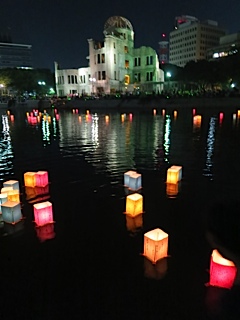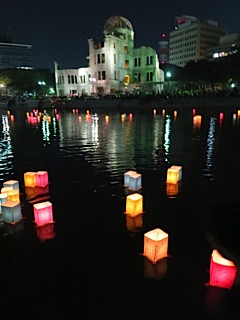Hiroshima’s Anniversary

Today I had the opportunity to visit the site of the first atomic bombing, Hiroshima, and participate in the annual commemoration. Events began at 8:15am this morning, sixty-eight years after the world entered the atomic age. I have written and taught about the atomic bomb for more than a decade, but I never really understood the meaning of this powerful weapon until today. Everyone who thinks about international security, foreign policy, and nuclear issues should visit Hiroshima on August 6.

Numerous scholars have written excellent books about the American decision to drop the first atomic bomb in Hiroshima, the effects of the bomb on the ground, the geopolitical consequences, the distorted memories of the event, and the uses of Hiroshima for political purpose. The permanent museum in Hiroshima addresses these issues in a partial and often biased way, but that is to be expected.
The museum, the haunting Atomic Dome, and the Peace Park are not the things that moved me at the commemoration today. Nor did the speeches by the visiting dignitaries, including Prime Minister Shinzo Abe, accomplish very much. Standard words about “suffering victims” and the “imperative for peace” did not have much effect.
What moved me was the assembly of young Japanese and Americans this evening around the site of the atomic blast. I have been to many demonstrations, but I have never seen anything like this before. Thousands of men and women below forty (I am on the borderline) decorated candles, made paper lanterns, and played music that evoked a shared hope for peace. There were no political slogans, no efforts to assign blame, no calls for easy answers. This was just a moment of supreme and sincere solidarity.
It was also a moment of deep Japanese and American friendship. The Peace Park was filled with Americans: students, military servicepeople, businesspeople, tourists, and parents. I have not seen so many Americans in Japan before. They walked side-by-side with Japanese they had never previously met, engaged in friendly but serious conversation, reflecting on the meaning of this moment.
None of this was organized or contrived. The young Americans and Japanese came to remember the tragedy of August 6. They enacted a common bond. The young Americans and Japanese also assembled to imagine a better future. They advocated a shared mission.
Again, there were no simple slogans or efforts to assign blame. There were no pretensions to easy answers. This was a moment of aspiration, an unscripted cross-cultural performance of young people who recognized the tragic history in Hiroshima and wanted to make it real for themselves. They made it real by transcending, at least for a moment, the angry arguments of politicians, pundits, and scholars.
The men and women who visited the atomic bomb site tonight took clear inspiration from a monumental tragedy to find new ways to come together. They modeled dialogue, civility, forgiveness, and cooperation because of what happened here sixty-eight years ago. They made a very dark history into a forward-looking light of hope. You could see it on their faces: solemn and hopeful, cautious and confident.
The time has come for historians, including this one, to re-write our histories of the atomic bomb. Here is what I will say the next time I lecture on this topic: On 6 August 1945 the United States dropped the first atomic bomb on Hiroshima, in hopes of ending the Second World War. The bomb caused enormous damage and suffering and it contributed to a Cold War. The experiences of the bomb, in both Japan and the United States, also brought these two warring societies together in startling, unpredictable, and enduring ways. The strength and depth of Japanese-American friendship since 1945 is a testament to how human beings can turn the worst weapons into catalysts for common action.
Contemporary leaders can learn a lot from this final insight. It was on display tonight, amidst all the partisan division in both Japan and the United States. Sometimes the best policy insights come from those who are concerned about the past, but not stuck in it.
The opinions expressed in this blog are personal and do not necessarily reflect the views of either Global Brief or the Glendon School of Public and International Affairs.











always a very special moment